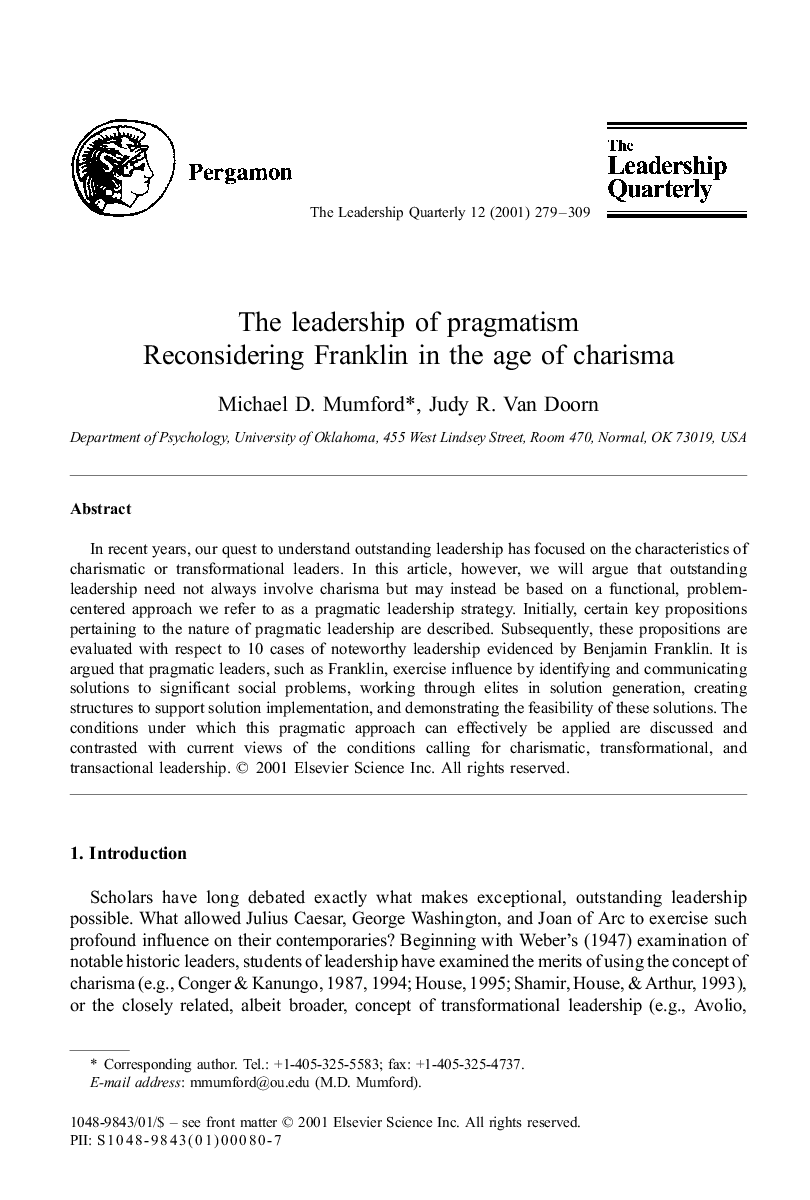In recent years, our quest to understand outstanding leadership has focused on the characteristics of charismatic or transformational leaders. In this article, however, we will argue that outstanding leadership need not always involve charisma but may instead be based on a functional, problem-centered approach we refer to as a pragmatic leadership strategy. Initially, certain key propositions pertaining to the nature of pragmatic leadership are described. Subsequently, these propositions are evaluated with respect to 10 cases of noteworthy leadership evidenced by Benjamin Franklin. It is argued that pragmatic leaders, such as Franklin, exercise influence by identifying and communicating solutions to significant social problems, working through elites in solution generation, creating structures to support solution implementation, and demonstrating the feasibility of these solutions. The conditions under which this pragmatic approach can effectively be applied are discussed and contrasted with current views of the conditions calling for charismatic, transformational, and transactional leadership.
Scholars have long debated exactly what makes exceptional, outstanding leadership possible. What allowed Julius Caesar, George Washington, and Joan of Arc to exercise such profound influence on their contemporaries? Beginning with Weber's (1947) examination of notable historic leaders, students of leadership have examined the merits of using the concept of charisma (e.g., Conger & Kanungo, 1987, Conger & Kanungo, 1994, House, 1995 and Shamir et al., 1993), or the closely related, albeit broader, concept of transformational leadership (e.g., Avolio et al., 1999, Bass, 1997 and Burns, 1978) to account for these incidents of outstanding leadership. In fact, the evidence compiled by Howell and Avolio (1993), Lowe, Koreck, and Sivasubramaniam (1996), and Yorges, Weiss, and Strickland (1999) among others indicate that charismatic and transformational leadership can indeed account for many incidents of exceptional leadership.
Charismatic and transformational leaders provide followers with a motivating sense of identity by presenting and articulating a vision (Shamir, Zakay, Breinin, & Popper, 1998). In contrast to this rather romantic view of leadership (Abra, 1994), one might propose a more rationalistic, or functional, view. In other words, one might ask whether exceptional leadership can be based on an appeal to “interest” in the common good rather than an appeal to identity. To explore the nature of this functional approach to leadership, we will, in the present article, examine 10 cases drawn from a noted historic leader. More specifically, we will examine the leadership strategies used by Benjamin Franklin whose apparent disdain for charisma is aptly summarized by his comment in the 1754 Poor Richard's Almanac: “In the affairs of this world men are saved not by faith but by want of it” (Franklin, 1754).


